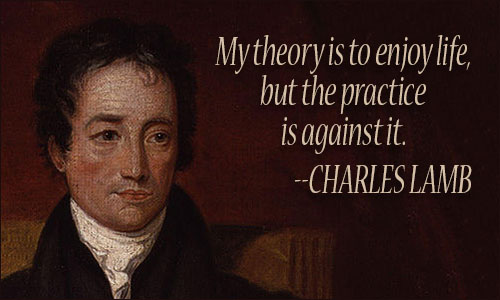CHARLES LAMB QUOTES II
English essayist and critic (1775-1834)

Notice: Undefined variable: id in /hermes/walnacweb03/walnacweb03ak/b2149/pow.notablequote/htdocs/l/includes/quoter.php on line 25
The laws of Pluto's kingdom know small difference between king and cobbler, manager and call-boy; and, if haply your dates of life were conterminant, you are quietly taking your passage, cheek by cheek (O ignoble leveling of Death) with the shade of some recently departed candle-snuffer.
CHARLES LAMB
Notice: Undefined variable: id in /hermes/walnacweb03/walnacweb03ak/b2149/pow.notablequote/htdocs/l/includes/quoter.php on line 35
"To the Shade of Elliston", Elia and the Last Essays of Elia
Notice: Undefined variable: id in /hermes/walnacweb03/walnacweb03ak/b2149/pow.notablequote/htdocs/l/includes/quoter.php on line 61
It is rather an unpleasant fact, that the ugliest and awkwardest of brute animals have the greatest resemblance to man: the monkey and the bear. The monkey is ugly too (so we think) because he is like man--as the bear is awkward, because the cumbrous action of its huge paws seems to be a preposterous imitation of the motions of human hands. Men and apes are the only animals that have hairs on the under eye-lid. Let kings know this.
CHARLES LAMB
"Table Talk", Works: Essays and Sketches
Newspapers always excite curiosity. No one ever lays one down without a feeling of disappointment.
CHARLES LAMB
"On Books and Reading", The Last Essays of Elia
He has left off reading altogether, to the great improvement of his originality.
CHARLES LAMB
Essays of Elia
The human species, according to the best theory I can form of it, is composed of two distinct races, the men who borrow, and the men who lend.
CHARLES LAMB
"The Two Races of Men", Essays of Elia
I can scarce bring myself to believe, that I am admitted to a familiar correspondence, and all the license of friendship, with a man who writes blank verse like Milton.
CHARLES LAMB
letter to Samuel Taylor Coleridge, Feb. 13, 1797
Take my word for this, reader, and say a fool told it you, if you please, that he who hath not a dram of folly in his mixture, hath pounds of much worse matter in his composition.
CHARLES LAMB
"All Fools' Day", Elia
There is a pleasure in affecting affectation.
CHARLES LAMB
"Table Talk", Works: Essays and Sketches
In some respects the better a book is, the less it demands from binding.
CHARLES LAMB
"On Books and Reading", The Last Essays of Elia
Credulity is the man's weakness, but the child's strength.
CHARLES LAMB
"Witches and Other Night Fears", Essays of Elia
A number of moralists condemn lotteries and refuse to see anything noble in the passion of the ordinary gambler. They judge gambling as some atheists judge religion, by its excesses.
CHARLES LAMB
Essays of Elia
What a place to be is an old library! It seems as though all the souls of all the writers, that have bequeathed their labours ... were reposing here, as in some dormitory, or middle state. I do not want to handle, to profane the leaves, their winding-sheets.
CHARLES LAMB
Elia and the Last Essays of Elia
A laugh is worth a hundred groans in any market.
CHARLES LAMB
Bon-Mots
Our appetites, of one or another kind, are excellent spurs to our reason, which might otherwise but feebly set about the great ends of preserving and continuing the species.
CHARLES LAMB
"Grace Before Meat", Elia
It is well if the good man himself does not feel his devotions a little clouded, those foggy sensuous steams mingling with and polluting the pure altar surface.
CHARLES LAMB
"Grace Before Meat", Elia
It is with some violation of the imagination that we conceive of an actor belonging to the relations of private life, so closely do we identify these persons in our mind with the characters which they assume upon the stage.
CHARLES LAMB
attributed, Day's Collacon
A pun is a pistol let off at the ear; not a feather to tickle the intellect.
CHARLES LAMB
"Popular Fallacies", Last Essays of Elia
'Tis unpleasant to meet a beggar. It is painful to deny him; and, if you relieve him, it is so much out of your pocket.
CHARLES LAMB
"Table-Talk and Fragments of Criticism", The Life and Works of Charles Lamb
Trample not on the ruins of a man.
CHARLES LAMB
"Confessions of a Drunkard", The Last Essays of Elia
Clap an extinguisher on your irony, if you are unhappily blessed with a vein of it.
CHARLES LAMB
A Complete Elia